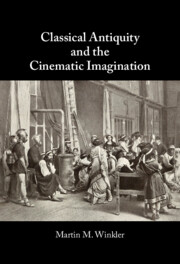Book contents
- Classical Antiquity and the Cinematic Imagination
- Classical Antiquity and the Cinematic Imagination
- Copyright page
- Dedication
- Contents
- Illustrations
- Preface
- I Prolegomena
- II Progymnasmata: Ways of Seeing
- III Complex Cinematism
- Chapter 4 Motion Images in Ecphrases
- Chapter 5 Shadows and Caves: The Cinema as Platonic Idea and Reality
- Chapter 6 Static Flight: Zeno’s Arrow and Cinematographic Motion
- Chapter 7 Lucretius: Dream Images and Beyond the Infinite
- Chapter 8 The Cinematic Nature of the Opening Scene in Heliodorus’ An Ethiopian Story
- Chapter 9 The Face of Tragedy: Mask and Close-Up
- IV The Cinema Imagines Difficult Texts
- V Epilegomena
- Bibliography
- Index
Chapter 7 - Lucretius: Dream Images and Beyond the Infinite
from III - Complex Cinematism
Published online by Cambridge University Press: 15 February 2024
- Classical Antiquity and the Cinematic Imagination
- Classical Antiquity and the Cinematic Imagination
- Copyright page
- Dedication
- Contents
- Illustrations
- Preface
- I Prolegomena
- II Progymnasmata: Ways of Seeing
- III Complex Cinematism
- Chapter 4 Motion Images in Ecphrases
- Chapter 5 Shadows and Caves: The Cinema as Platonic Idea and Reality
- Chapter 6 Static Flight: Zeno’s Arrow and Cinematographic Motion
- Chapter 7 Lucretius: Dream Images and Beyond the Infinite
- Chapter 8 The Cinematic Nature of the Opening Scene in Heliodorus’ An Ethiopian Story
- Chapter 9 The Face of Tragedy: Mask and Close-Up
- IV The Cinema Imagines Difficult Texts
- V Epilegomena
- Bibliography
- Index
Summary
Like Aristotle, the Roman epic poet Lucretius was mistakenly credited with knowledge, or even use, of the camera obscura. Few classical scholars today are aware of this strange but fascinating facet in Lucretius’ intellectual afterlife. The error arose from the misunderstanding of a passage in On the Nature of Things, in which Lucretius referred to the changes and movements of bodies in dreams. Nineteenth-century scientists compared Lucretius’ lines to stroboscopic light effects. Although Belgian scientist Joseph Plateau, inventor of the phenakistiscope, set the record straight, the misunderstanding continued into the age of cinema. The first part of this chapter traces the error through the historiography of the cinema with all its amusing misconceptions, which include an anecdote about Lucretius himself. The chapter’s second part examines the striking resemblances to Lucretius’ epic in Stanley Kubrick’s 2001: A Space Odyssey.
Keywords
- Type
- Chapter
- Information
- Classical Antiquity and the Cinematic Imagination , pp. 233 - 266Publisher: Cambridge University PressPrint publication year: 2024

